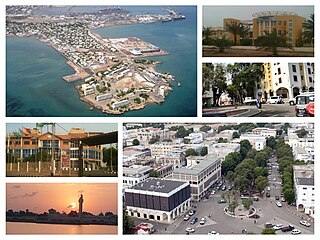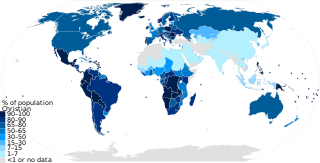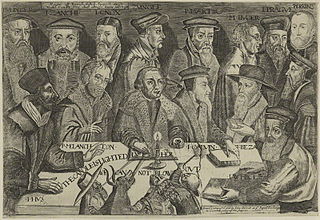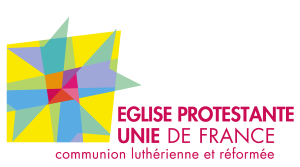Related Research Articles

Reformed Christianity, also called Calvinism, is a major branch of Protestantism that began during the 16th-century Protestant Reformation. In the modern day, it is largely represented by the Continental Reformed, Presbyterian, and Congregational traditions, as well as parts of the Anglican and Baptist traditions.
A Christian denomination is a distinct religious body within Christianity that comprises all church congregations of the same kind, identifiable by traits such as a name, particular history, organization, leadership, theological doctrine, worship style and, sometimes, a founder. It is a secular and neutral term, generally used to denote any established Christian church. Unlike a cult or sect, a denomination is usually seen as part of the Christian religious mainstream. Most Christian denominations refer to themselves as churches, whereas some newer ones tend to interchangeably use the terms churches, assemblies, fellowships, etc. Divisions between one group and another are defined by authority and doctrine; issues such as the nature of Jesus, the authority of apostolic succession, biblical hermeneutics, theology, ecclesiology, eschatology, and papal primacy may separate one denomination from another. Groups of denominations—often sharing broadly similar beliefs, practices, and historical ties—are sometimes known as "branches of Christianity". These branches differ in many ways, especially through differences in practices and belief.
The Dutch Reformed Church was the largest Christian denomination in the Netherlands from the onset of the Protestant Reformation in the 16th century until 1930. It was the traditional denomination of the Dutch royal family and the foremost Protestant denomination until 2004, the year it helped found and merged into the Protestant Church in the Netherlands. It was the larger of the two major Reformed denominations, after the Reformed Churches in the Netherlands was founded in 1892. It spread to the United States, South Africa, Indonesia, Sri Lanka, Brazil, and various other world regions through Dutch colonization. Allegiance to the Dutch Reformed Church was a common feature among Dutch immigrant communities around the world and became a crucial part of Afrikaner nationalism in South Africa.

A united church, also called a uniting church, is a denomination formed from the merger or other form of church union of two or more different Protestant Christian denominations, a number of which come from separate and distinct denominational orientations or traditions. Multi-denominationalism, or a multi-denominational church or organization, is a congregation or organization that is affiliated with two or more Christian denominations, whether they be part of the same tradition or from separate and distinct traditions.

Djibouti is the capital city of the Republic of Djibouti. It is located in the coastal Djibouti Region on the Gulf of Tadjoura.
Protestants in Vietnam are a religious minority, constituting 1% of the population in 2022. Though its numbers are small, Protestantism is the country's fastest-growing religion, growing at a rate of 600% in the early 2000s.

As of the year 2023, Christianity had approximately 2.4 billion adherents and is the largest religion by population. According to a PEW estimation in 2020, Christians made up to 2.38 billion of the worldwide population of about 8 billion people. It represents nearly one-third of the world's population and is the largest religion in the world, with the three largest groups of Christians being the Catholic Church, Protestantism, and the Eastern Orthodox Church. The largest Christian denomination is the Catholic Church, with 1.3 billion baptized members. The second largest Christian branch is either Protestantism, or the Eastern Orthodox Church.

The Catholic Church in Djibouti is part of the worldwide Catholic Church, under the spiritual leadership of the Pope in Rome.

Christianity is the largest religion in Luxembourg, with significant minorities of non-religious people and adherents of other faiths.

Lutheranism is present on all inhabited continents with an estimated 80 million adherents, out of which 74.2 million are affiliated with the Lutheran World Federation. A major movement that first began the Reformation, it constitutes one of the largest Protestant branches claiming around 80 million out of 920 million Protestants. The Lutheran World Federation brings together the vast majority of Lutherans. Apart from it, there are also other organisations such as the International Lutheran Council and the Confessional Evangelical Lutheran Conference, as well as multiple independent Lutheran denominations.

Christianity in Italy has been historically characterised by the dominance of the Catholic Church since the East–West Schism. However, the country is also home to significant Christian minorities, especially Orthodox Christians, Protestants and Jehovah's Witnesses.

The Protestant Church of Algeria is a federation of Protestant churches from the Reformed and Methodist traditions established in 1972 in Algeria. It is officially recognised by the government of Algeria as the Association of the Protestant Church of Algeria.

Reformed Christianity originated with the Reformation in Switzerland when Huldrych Zwingli began preaching what would become the first form of the Reformed doctrine in Zürich in 1519.
L'Église réformée du Québec, or "Reformed Church of Quebec", is a small conservative French-speaking Reformed Christian denomination located in the Canadian province of Quebec.

Christianity is the religion of 6% of the population of Djibouti. Christians are mostly of Ethiopian and European ancestry. Most Christians are Ethiopian Orthodox or Roman Catholic. The constitution of Djibouti includes freedom of religion, although Islam is the state religion. There is a tolerant attitude between religions in general. Proselytizing by any faith in public is not allowed.

Protestantism is a branch of Christianity that emphasizes justification of sinners through faith alone, the teaching that salvation comes by unmerited divine grace, the priesthood of all believers, and the Bible as the sole infallible source of authority for Christian faith and practice. The five solae summarize the basic theological beliefs of mainstream Protestantism.
The Reformed Church in Zambia is among the biggest Reformed churches in the country of Zambia.

The Evangelical Church of the River Plate is a United, Protestant denomination with congregations in Argentina, Paraguay, and Uruguay. It is named after the Río de la Plata Basin, where the majority of its congregations are located. The IERP was affiliated with the Evangelical Church in Germany from 1934–1965, when it became independent. The church ordains women as ministers and supported civil unions and same-sex marriage. It has approximately 27,500 members. The denomination is a member of the World Council of Churches and the Lutheran World Federation.

The United Protestant Church of France is the main and largest Protestant church in France, created in 2013 through the unification of the Reformed Church of France and the Evangelical Lutheran Church of France. It is active in all parts of Metropolitan France apart from Alsace and Moselle, where the Union of Protestant Churches of Alsace and Lorraine is established. It has 250,000 members and its orientation is both Calvinist and Lutheran, mainly in that it incorporates both kinds of parishes throughout the country. Ordination of women and blessings of same-sex marriages are allowed. The church believes abortion may be allowable under certain circumstances.
References
- ↑ World Christian Encyclopedia (2nd Edition), Volume 1, p. 241
- ↑ "Address data base of Reformed churches and institutions". Reformiert-online.net. Retrieved 2015-05-29.
- ↑ "Djibouti, église protestante évangélique française" (in French). Wiki-protestants.org. Retrieved 2015-05-29.